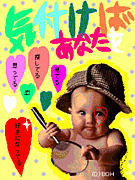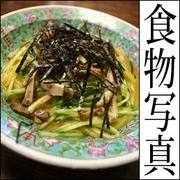世界の母の日を知ってみよう
MOTHER'S DAY
Mother's Day is a holiday to honor and give thanks to our mothers. People celebrate the day all over the world. In France, a flower-shaped cake is part of the family meal. In the U.S., most restaurants claim this day as their busiest all year. In many other countries, carnations have a special significance.
Although the holiday is very commercial, it's not a Hallmark holiday. In other words, it's not a holiday created by businesses to make money. Mother's Day actually has its origins long ago in ancient Greece. Rome, which copied much of the Greek way of life, had a similar holiday. So did other countries around the Mediterranean Sea. Unlike today, though, people didn't honor their own mothers. People honored the mother of the gods, Rhea. After the Roman Empire fell, Mother's Day disappeared.
So how did our modern version of the holiday come about?
Many believe that Mother's Day as we know it originated from the British holiday called "Mothering Sunday." All through the Middle Ages in Europe, people brought gifts to their home (or mother) church on the fourth Sunday of Lent. Then in the 16th century, people began to live greater and greater distances from where they had been born. About this time, it also became increasingly common for children to work far from home as servants and apprentices. They would often need the day off to make the journey, which also allowed them to visit their mothers and family. They would bring a cake and pick wildflowers to give as presents, too. From here the holiday was born.
Americans have had a great influence on the holiday, too. A woman named Julia Ward Howe brought the holiday from Britain in the 1870s. She saw it as a way to honor mothers, of course, but also as a way to honor and promote peace. Then in the early 1900s, another woman campaigned for a national holiday for mothers. Her name was Anna Jarvis, and she sent letters to business leaders, clergy members, women's clubs, and anyone else who might help. Within a few years, forty-six States celebrated the holiday. In 1914, Mother's Day became an official holiday, and was quickly commercialized with cards, carnation flowers, and chocolate candy. Anna Jarvis "wanted it to be a day of sentiment, not profit." She also called greeting cards "a poor excuse for the letter you are too lazy to write!"
Different countries celebrate the holiday on different days. Different countries have adopted different traditions. But one thing remains the same everywhere: it's a day to say to your mom, "Thank you."
母の日は、感謝を尊敬し、私達の母に与える休日です。 人々は日を世界中で祝福します。 フランスでは、花形のケーキは家族一緒の食事の一部です。 米国では、ほとんどのレストランは、すべての年にそれらの最も忙しさのためこの日に主張します。 多くの他の国には、カーネーションは特別な意義を持っています。
休日は非常に商業用であるけれども、それはホールマーク休日ではありません。 すなわち、それは、金儲けするようにビジネスにより作成された休日ではありません。 母の日は実際、ずっと前に古代のギリシャにその起源を持っています。 ライフのギリシア式の多くをコピーしたローマは、同様な休日を過ごしました。 そう、地中海のまわりの他の国をしました。 しかし、今日と違って、人々は彼ら自身の母を尊敬しませんでした。 人々は神、レアの母を尊敬しました。 ローマ帝国が落ちた後に、母の日は消えました。
従って、どのように、休日 まわりに来る の私達の現代のバージョンをしましたか?
多くは、私達がそれを知っていることとしての母の日が、英国休日呼ばれた「喜びの主日。」に端を発したと信じます。 ヨーロッパの中世の間のすべて、レントの4番目の日曜日のそれらの家庭(または母)の教会への人々持参贈り物。 そして、16世紀に、人々は、それらが誕生した所からますます大きい距離で暮らしはじめました。 この時間ごろに、また、子供が使用人と見習いとして家から遠くに働くことが、ますます共通になりました。 またそれらがそれらの母とファミリーを訪問することを可能にした旅をするために、しばしばそれらには休暇が必要です。 彼らはケーキを持って来、プレゼントとして与えるために、野草に穴をあけます。 ここから、休日は誕生しました。
アメリカ人も休日への大きい影響を持っていました。 女性は、1870年代に英国から休日を持って来られるジュリア・ウォード・ハウを名付けました。 彼女は、平和を尊敬し、促進するための方法として母も尊敬していることを方法と考えました。 そして、1900年代初期に、別の女性は母のための国民祝日にキャンペーンをしました。 彼女の名前はアンナ・ジャービス、および彼女でした 財界の指導者、牧師メンバー、女性のクラブ、および助けることができる他の誰かへの送られた手紙 。 数年内では、46の米国が休日を祝福しました。 1914年に、母の日は公式な休日になり、カード、カーネーション花、およびチョコレートキャンディーで迅速に商業化されました。 「利益ではなく、1日の感傷になりたい それ 。」というアンナ・ジャービス。 彼女は、グリーティングカードも、「 手紙のための貧しい弁解 怠惰すぎるので書くことができません!」と呼びました。
種々の国は種々の日に休日を祝福します。 種々の国は種々の伝統を採用しました。 しかし、1つの物がどこにも同じであり続けます: ママ「ありがとう。」に言うことが日です
MOTHER'S DAY
Mother's Day is a holiday to honor and give thanks to our mothers. People celebrate the day all over the world. In France, a flower-shaped cake is part of the family meal. In the U.S., most restaurants claim this day as their busiest all year. In many other countries, carnations have a special significance.
Although the holiday is very commercial, it's not a Hallmark holiday. In other words, it's not a holiday created by businesses to make money. Mother's Day actually has its origins long ago in ancient Greece. Rome, which copied much of the Greek way of life, had a similar holiday. So did other countries around the Mediterranean Sea. Unlike today, though, people didn't honor their own mothers. People honored the mother of the gods, Rhea. After the Roman Empire fell, Mother's Day disappeared.
So how did our modern version of the holiday come about?
Many believe that Mother's Day as we know it originated from the British holiday called "Mothering Sunday." All through the Middle Ages in Europe, people brought gifts to their home (or mother) church on the fourth Sunday of Lent. Then in the 16th century, people began to live greater and greater distances from where they had been born. About this time, it also became increasingly common for children to work far from home as servants and apprentices. They would often need the day off to make the journey, which also allowed them to visit their mothers and family. They would bring a cake and pick wildflowers to give as presents, too. From here the holiday was born.
Americans have had a great influence on the holiday, too. A woman named Julia Ward Howe brought the holiday from Britain in the 1870s. She saw it as a way to honor mothers, of course, but also as a way to honor and promote peace. Then in the early 1900s, another woman campaigned for a national holiday for mothers. Her name was Anna Jarvis, and she sent letters to business leaders, clergy members, women's clubs, and anyone else who might help. Within a few years, forty-six States celebrated the holiday. In 1914, Mother's Day became an official holiday, and was quickly commercialized with cards, carnation flowers, and chocolate candy. Anna Jarvis "wanted it to be a day of sentiment, not profit." She also called greeting cards "a poor excuse for the letter you are too lazy to write!"
Different countries celebrate the holiday on different days. Different countries have adopted different traditions. But one thing remains the same everywhere: it's a day to say to your mom, "Thank you."
母の日は、感謝を尊敬し、私達の母に与える休日です。 人々は日を世界中で祝福します。 フランスでは、花形のケーキは家族一緒の食事の一部です。 米国では、ほとんどのレストランは、すべての年にそれらの最も忙しさのためこの日に主張します。 多くの他の国には、カーネーションは特別な意義を持っています。
休日は非常に商業用であるけれども、それはホールマーク休日ではありません。 すなわち、それは、金儲けするようにビジネスにより作成された休日ではありません。 母の日は実際、ずっと前に古代のギリシャにその起源を持っています。 ライフのギリシア式の多くをコピーしたローマは、同様な休日を過ごしました。 そう、地中海のまわりの他の国をしました。 しかし、今日と違って、人々は彼ら自身の母を尊敬しませんでした。 人々は神、レアの母を尊敬しました。 ローマ帝国が落ちた後に、母の日は消えました。
従って、どのように、休日 まわりに来る の私達の現代のバージョンをしましたか?
多くは、私達がそれを知っていることとしての母の日が、英国休日呼ばれた「喜びの主日。」に端を発したと信じます。 ヨーロッパの中世の間のすべて、レントの4番目の日曜日のそれらの家庭(または母)の教会への人々持参贈り物。 そして、16世紀に、人々は、それらが誕生した所からますます大きい距離で暮らしはじめました。 この時間ごろに、また、子供が使用人と見習いとして家から遠くに働くことが、ますます共通になりました。 またそれらがそれらの母とファミリーを訪問することを可能にした旅をするために、しばしばそれらには休暇が必要です。 彼らはケーキを持って来、プレゼントとして与えるために、野草に穴をあけます。 ここから、休日は誕生しました。
アメリカ人も休日への大きい影響を持っていました。 女性は、1870年代に英国から休日を持って来られるジュリア・ウォード・ハウを名付けました。 彼女は、平和を尊敬し、促進するための方法として母も尊敬していることを方法と考えました。 そして、1900年代初期に、別の女性は母のための国民祝日にキャンペーンをしました。 彼女の名前はアンナ・ジャービス、および彼女でした 財界の指導者、牧師メンバー、女性のクラブ、および助けることができる他の誰かへの送られた手紙 。 数年内では、46の米国が休日を祝福しました。 1914年に、母の日は公式な休日になり、カード、カーネーション花、およびチョコレートキャンディーで迅速に商業化されました。 「利益ではなく、1日の感傷になりたい それ 。」というアンナ・ジャービス。 彼女は、グリーティングカードも、「 手紙のための貧しい弁解 怠惰すぎるので書くことができません!」と呼びました。
種々の国は種々の日に休日を祝福します。 種々の国は種々の伝統を採用しました。 しかし、1つの物がどこにも同じであり続けます: ママ「ありがとう。」に言うことが日です
|
|
|
|
|
|
|
|
英語好き 一日一単語 更新情報
-
最新のトピック
-
最新のイベント
-
まだ何もありません
-
-
最新のアンケート
-
まだ何もありません
-
英語好き 一日一単語のメンバーはこんなコミュニティにも参加しています
人気コミュニティランキング
- 1位
- マイミク募集はここで。
- 89855人
- 2位
- 食べ物写真をつい撮ってしまう人
- 19393人
- 3位
- 暮らしを楽しむ
- 75781人



















